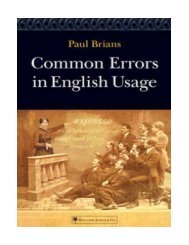url?sa=t&source=web&cd=3&ved=0CC0QFjAC&url=http://www.teachingenglish.org.uk/sites/teacheng/files/B369-Young-Learners-Activity-Book_v10
url?sa=t&source=web&cd=3&ved=0CC0QFjAC&url=http://www.teachingenglish.org.uk/sites/teacheng/files/B369-Young-Learners-Activity-Book_v10
url?sa=t&source=web&cd=3&ved=0CC0QFjAC&url=http://www.teachingenglish.org.uk/sites/teacheng/files/B369-Young-Learners-Activity-Book_v10
You also want an ePaper? Increase the reach of your titles
YUMPU automatically turns print PDFs into web optimized ePapers that Google loves.
TeachingEnglish <strong>Young</strong> <strong>Learners</strong> <strong>Activity</strong> <strong>Book</strong><br />
Introduction<br />
A system that we have observed in primary<br />
classes involves dividing the class into small<br />
groups (4–6 children per group), and using<br />
a reward point system. The groups can be<br />
changed regularly, once a month for example,<br />
and different strategies can be used to form<br />
the groups, with the teachers either choosing<br />
the groups or making a random selection, or<br />
children choosing their own groups. Children<br />
then earn points for their group, rather than<br />
rewards for themselves. Points are given for<br />
performing well in activities, for good behaviour<br />
in class, for completing homework, answering<br />
questions in class, and classroom management,<br />
such as finding material quickly. This reward<br />
system encourages collective class responsibility.<br />
Competition<br />
Some of the activities encourage both<br />
individual and group competition, with a<br />
‘winner’ at the end. While a certain amount<br />
of competition can be healthy, the same<br />
potential difficulties exist as with using rewards.<br />
Competition can push some children to perform<br />
better, but it can be de-motivating for others.<br />
We suggest a limited use of competition in<br />
activities and a preference for collective<br />
responsibility whereby a child wins for their<br />
group, rather than for themselves.<br />
Concluding Comments<br />
We have had great fun putting this book<br />
together and learnt a lot of new approaches<br />
and ideas for teaching English to young<br />
learners. We hope that in using the book you<br />
will also have fun and learn, and that your<br />
children will too!<br />
We would love to hear from you about your<br />
experiences in using these activities and any<br />
changes you make to meet your children’s<br />
needs or that of the context in which you work.<br />
Send your thoughts and ideas to lss_activities@<br />
aston.ac.<strong>uk</strong><br />
References<br />
English for Primary Teachers (Resource <strong>Book</strong>s<br />
for Teachers) by Mary Slattery and Jane Willis<br />
(24 May 2001) Oxford OUP<br />
6<br />
© British Council 2012





